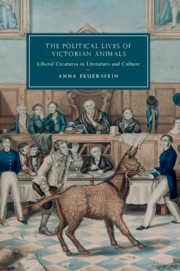Book contents
- The Political Lives of Victorian Animals
- Cambridge Studies in Nineteenth-Century Literature and Culture
- The Political Lives of Victorian Animals
- Copyright page
- Dedication
- Epigraph
- Contents
- Figures
- Acknowledgments
- Introduction
- Part I Anti-Cruelty Legislation and Animal Welfare
- Part II Democracy, Education, and Alternative Subjectivity
- Part III The Biopolitics of Animal Capital
- Coda
- Works Cited
- Index
- Cambridge Studies in Nineteenth-Century Literature and Culture
Part II - Democracy, Education, and Alternative Subjectivity
Published online by Cambridge University Press: 08 June 2019
- The Political Lives of Victorian Animals
- Cambridge Studies in Nineteenth-Century Literature and Culture
- The Political Lives of Victorian Animals
- Copyright page
- Dedication
- Epigraph
- Contents
- Figures
- Acknowledgments
- Introduction
- Part I Anti-Cruelty Legislation and Animal Welfare
- Part II Democracy, Education, and Alternative Subjectivity
- Part III The Biopolitics of Animal Capital
- Coda
- Works Cited
- Index
- Cambridge Studies in Nineteenth-Century Literature and Culture
Summary
This chapter analyzes Charles Dickens’s Hard Times, Oliver Twist, and Barnaby Rudge to show how the Dickensian novel includes animals in its political critiques, questions the belief that humans have access to animal subjectivity, and cultivates an alternate form of animal character. Although Dickens rarely removes himself from ideologies of pastoral power, his animals often function outside it. Dickens’s animal characters critique dominant notions of liberal character and the character of government, offering a way out from animalizing discourses of both animal and working-class character. This chapter engages with discourse surrounding the New Poor Law and Chartism, and shows how Dickens’s animal characters can be considered minor characters who reflect demands for democracy throughout the period. These three novels highlight the radical nature of Dickens’s animal politics, as they challenge larger constructions of liberal character and posit alternate animal subjectivities within a more democratic political community.
Keywords
- Type
- Chapter
- Information
- The Political Lives of Victorian AnimalsLiberal Creatures in Literature and Culture, pp. 93 - 160Publisher: Cambridge University PressPrint publication year: 2019

